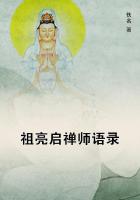3. We have now to speak of Spinoza's system of morals, and that is a subject of importance. Its great principle is no other than this, that the finite spirit is moral in so far as it has the true Idea, i.e., in so far as it directs its knowledge and will on God, for truth is merely the knowledge of God. It may be said that there is no morality loftier than this, since its only requisite is to have a clear idea of God. The first thing Spinoza speaks of in this regard is the affections: “Everything strives after self-preservation. This striving is the actual essence of the thing, and involves only indefinite time;when referred exclusively to mind, it is termed will; when referred to both mind and body together, it is called desire. Determination of the will (volitio) and Idea are one and the same thing. The sense of liberty rests on this, that men do not know the determining causes of their actions. The affection is a confused Idea; the more clearly and distinctly, therefore, we know the affection, the more it is under our control.”(11) The influence of the affections, as confused and limited (inadequate) ideas, upon human action, constitutes therefore, according to Spinoza, human slavery; of the passionate affections the principal are joy and sorrow; we are in suffering and slavery in so far as we relate ourselves as a part.(12)“Our happiness and liberty consist in an enduring and eternal love to God; this intellectual love follows from the nature of mind in so far as it is regarded as eternal truth through the nature of God. The more a man recognizes God's existence and loves Him, the less does he suffer from evil affections and the less is his fear of death.”(13) Spinoza requires in addition the true kind of knowledge. There are, according to him, three kinds of knowledge; in the first, which he calls opinion and imagination, he includes the knowledge which we obtain from an individual object through the senses - a knowledge fragmentary and ill-arranged - also knowledge drawn from signs, pictorial conceptions and memory. The second kind of knowledge is for Spinoza that which we derive from general conceptions and adequate ideas of the properties of things. The third is intuitive knowledge (scientia intuitiva) which rises from the adequate idea of the formal essence of certain attributes of God to the adequate knowledge of the essence of things.”(14) Regarding this last he then says: “The nature of reason is not to contemplate things as contingent, but as necessary . . . to think of all things under a certain form of eternity (sub quadam specie ?ternitatis);” i.e., in absolutely adequate Notions, i.e. in God. “For the necessity of things is the necessity of the eternal nature of God Himself. Every idea of an individual thing necessarily includes the eternal and infinite essence of God in itself. For individual things are modes of an attribute of God; therefore they must include in themselves His eternal essence. Our mind, in so far as it knows itself and the body under the form of eternity, has to that extent necessarily the knowledge of God, and knows that it is itself in God and is conceived through God. All Ideas, in so far as they are referable to God, are true.”(15) Man must trace back all things to God, for God is the One in All; the eternal essence of God is the one thing that is, the eternal truth is the only thing for man to aim at in his actions. With Spinoza this is not a knowledge arrived at through philosophy, but only knowledge of a truth. “The mind can succeed in tracing back all affections of the body or images of things to God. In proportion as the mind regards all things as necessary, it has a greater power over its affections,” which are arbitrary and contingent. This is the return of the mind to God, and this is human *******; as mode, on the other hand, the spirit has no *******, but is determined from without. “From the third kind of knowledge there arises the repose of the mind; the supreme good of the mind is to know God, and this is the highest virtue.
This knowledge necessarily produces the intellectual love of God; for it produces a joyfulness accompanied by the Idea of God as cause - i.e. the intellectual love of God. God Himself loves Himself with an infinite intellectual love.”(16) For God can have only Himself as aim and cause;and the end of the subjective mind is to be directed on Him. This is therefore the purest, but also a universal morality.
In the thirty-sixth Letter (pp. 581-582) Spinoza, speaks of Evil. The allegation is made that God, as the originator of all things and everything, is also the originator of evil, is consequently Himself evil; in this identity all things are one, good and evil are in themselves the same thing, in God's substance this difference has disappeared. Spinoza says in answer to this “I assert the fact that God absolutely and truly” (as cause of Himself) “is the cause of everything that has an essential content” (i.e., affirmative reality) “be it what it may. Now if you can prove to me that evil, error, crime, etc., are something that expresses an essence, I will freely admit to you that God is the originator of crime and evil and error. But I have elsewhere abundantly demonstrated that the form of evil cannot subsist in anything that expresses an essence, and therefore it cannot be said that God is the cause of evil.” Evil is merely negation, privation, limitation, finality, mode - nothing in itself truly real. “Nero's murder of his mother, in so far as it had positive content, was no crime.
For Orestes did the same external deed, and had in doing itthe same end in view - to kill his mother; and yet he is not blamed,” and so on. The affirmative is the will, the intention, the act of Nero. “Wherein then consists Nero's criminality? In nothing else but that he proved himself ungrateful, merciless, and disobedient. But it is certain that all this expresses no essence, and therefore God was not the cause of it, though He was the cause of Nero's action and intention.”














